仁爱英语八年级上册语法总结练习
仁爱英语2019-2020学年八年级上册语法归纳及练习
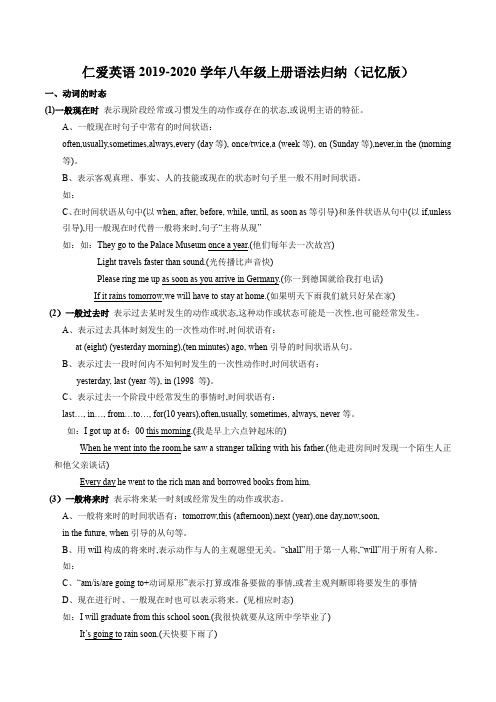
仁爱英语2019-2020学年八年级上册语法归纳(记忆版)一、动词的时态(1)一般现在时表示现阶段经常或习惯发生的动作或存在的状态,或说明主语的特征。
A、一般现在时句子中常有的时间状语:often,usually,sometimes,always,every (day等), once/twice,a (week等), on (Sunday等),never,in the (morning 等)。
B、表示客观真理、事实、人的技能或现在的状态时句子里一般不用时间状语。
如:C、在时间状语从句中(以when, after, before, while, until, as soon as等引导)和条件状语从句中(以if,unless引导),用一般现在时代替一般将来时,句子“主将从现”如:如:They go to the Palace Museum once a year.(他们每年去一次故宫)Light travels faster than sound.(光传播比声音快)Please ring me up as soon as you arrive in Germany.(你一到德国就给我打电话)If it rains tomorrow,we will have to stay at home.(如果明天下雨我们就只好呆在家)(2)一般过去时表示过去某时发生的动作或状态,这种动作或状态可能是一次性,也可能经常发生。
A、表示过去具体时刻发生的一次性动作时,时间状语有:at (eight) (yesterday morning),(ten minutes) ago, when引导的时间状语从句。
B、表示过去一段时间内不知何时发生的一次性动作时,时间状语有:yesterday, last (year等), in (1998 等)。
C、表示过去一个阶段中经常发生的事情时,时间状语有:last…, in…, from…to…, for(10 years),often,usually, sometimes, always, never等。
仁爱英语八年级上册语言点、语法总结归纳
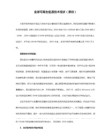
八年级上学期期末复习资料Unit One语法:一般将来时结构:be (am/ is /are)going to do sth. 表示计划、打算或安排搭配词:tomorrow;the day after tomorrow;tomorrow morning/...next week/month/Friday/...this morning/afternoon/evening/week/term/...; tonightin a week => in + 一段时间; 注意划线的提问词用how soonin the futurefour days later => 一段时间+ latersb. hope/wish + 宾语从句(将来时)e.g. Our Chinese teacher is going to give (give)a speech this Friday.否定句:Our Chinese teacher isn't going to give a speech this Friday.一般疑问句:Is our Chinese teacher going to give a speech this Friday?肯定回答:Yes, he is.否定回答:No,he isn't.画线提问:When is he going to give a speech?Topic 11.see sb. do sth. “看到某人做了某事(强调过程,经常发生)”see sb. doing sth.“看到某人在做某事(强调瞬间,偶尔发生)”类似用法的动词还有:find; watch; hear;noticee.g. We just found Tom reading a book in his study.Mr. Green often hears the little girl play the piano.2.during(介词) the summer holidaysp.s. 介词后跟动词,动词应加ing。
初中英语仁爱版八年级上册知识点重点归纳与习题精炼
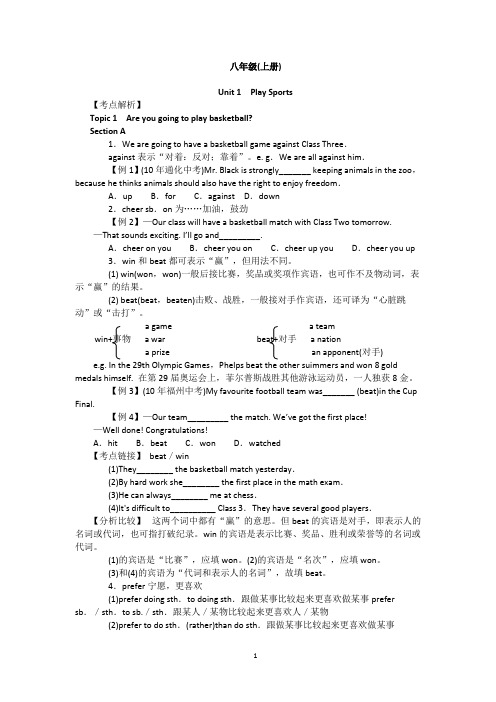
八年级(上册)Unit 1 Play Sports【考点解析】Topic 1 Are you going to play basketball?Section A1.We are going to have a basketball game against Class Three.against表示“对着:反对;靠着”。
e. g.We are all against him.【例1】(10年通化中考)Mr. Black is strongly_______ keeping animals in the zoo,because he thinks animals should also have the right to enjoy freedom.A.up B.for C.against D.down2.cheer sb.on为……加油,鼓劲【例2】—Our class will have a basketball match with Class Two tomorrow.—That sounds exciting. I’ll go and_________.A.cheer on you B.cheer you on C.cheer up you D.cheer you up3.win和beat都可表示“赢”,但用法不同。
(1) win(won,won)一般后接比赛,奖品或奖项作宾语,也可作不及物动词,表示“赢”的结果。
(2) beat(beat,beaten)击败、战胜,一般接对手作宾语,还可译为“心脏跳动”或“击打”。
a game a teamwin+事物 a war beat+对手 a nationa prize an apponent(对手)e.g. In the 29th Olympic Games,Phelps beat the other suimmers and won 8 gold medals himself. 在第29届奥运会上,菲尔普斯战胜其他游泳运动员,一人独获8金。
仁爱版英语八年级上册主要语法点及练习 课件 (共40张PPT)精编版

2. I think ____a foreign language is not easy. You should ___ it often.
A. to learn; to practice B. learning; practice
C. learn; practicing
仁爱八年级上册主要语法点复 习及练习题 德化三中
There be句型的一般将来时
1. There __ an English party in our class next week.
A. is going to have B. is going to be
C. will have
D. have
2. There ___ a football match next week. Shall we go and watch it?
1. —What’s your hobby, please? —I ____ dancing.
A. am fond of B. enjoy
C. prefer
D. A, B and C
2. — Does your father like collecting stamps?
— He isn’t ___ it . He is ___ collecting old clocks .
--ed,--ing
1. All the Chinese were __ when they heard Liu Xiang won the first. It was really ______. A. exciting, excited B. excited, exciting C. exciting, exciting D. excited, excited
年秋季仁爱英语八年级上册Unit4topic2重点知识点总结及练习

八年级上册Unit 4 Our worldTopic 2 How can we protect ourselves from the earthquake?一.重点句型:Section A1.A terrible earthquake struck Qinghai.一场可怕的地震袭击了青海。
strike意为“侵袭,爆发”,过去式struck。
The lightning struck again. 雷电再次闪击。
2.Many buildings fell down.Some people died and many people are missing. 许多建筑倒塌,很多人死亡,还有许多人失踪。
fall down 倒塌,跌倒,下落;I fell down and hurt my knee. 我摔倒弄伤了膝盖。
3. And I know that there were anther two terrible earthquakes in China. 我还直到发生在中国的另外两次严重的地震。
another意为:“又一,再一,另一(事物或人)”,后面可接单数名词、数字加复数的名词。
another + 数字+ 复数名词= 数字+more +复数名词;Would you like another apple?你想再来一个苹果吗?another 3 hours = 3 more hours 另外三个小时;4. I’m very sorry to hear that. 听到这个消息很遗憾。
表达听者难过、同情或抱歉的心情。
此句是表示关心的句子。
-----I have a bad cold today. 今天我得了重感冒。
----- I’m very sorry to hear that. 听到这个消息很遗憾。
5. I think the Wenchuan earthquake in 2008 was more serious than this one,but theTangshan earthquake in 1976 was the most serious. 我认为2008年的汶川地震比这个地震要严重,但是1976年的唐山大地震是最严重的。
仁爱版英语八年级上册主要语法点及练习 共40张

How long did you do your homework?
仁爱版英语八年级上册主要语法点
9
及练习 共40张
1. Don’t shout at him. He is only _______ boy. A. a eight-year-old B. an eight-year-old C. a eight years old D. an eight years old
A. am going C. am
B. am going to D. going to
仁爱版英语八年级上册主要语法点
4
及练习 共40张
Would you mind用法
1.Would you mind (not)doing sth? 2. Would you mind if +从句(如果我做…你会介意吗) 3.Would you please(not) do sth? 4.Could you please (not) do sth?
—_______
A. Oh, it doesn’t matter. B. You’re welcome.
C. That’s OK.
D. Thank you all the same.
仁爱版英语八年级上册主要语法点
8
及练习 共40张
How often, how long
1. —___do you play computer games?
—Every ni
C. How much
D. How often
2. — ___ have you been like this?
—Three days.
A. How long B. How soon
最新仁爱英语八年级上册语法总结练习
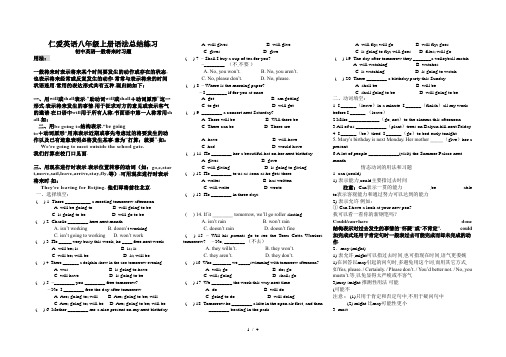
仁爱英语八年级上册语法总结练习初中英语一般将来时习题用法:一般将来时表示将来某个时间要发生的动作或存在的状态,也表示将来经常或反复发生的动作.常常与表示将来的时间状语连用.常用的表达形式共有五种,现归纳如下:一、用will或shall表示.“助动词will或shall+动词原形”这一形式,表示将来发生的事情,用于征求对方的意见或表示客气的邀请.在口语中will用于所有人称,书面语中第一人称常用sh all.如:二、用be going to结构表示.“be goingto+动词原形”用来表示近期或事先考虑过的将要发生的动作以及已有迹象表明必将发生某事,意为“打算;就要”.如:We're going to meet outside the school gate.我们打算在校门口见面.三、用现在进行时表示.表示位置转移的动词(如:go,e,star t,move,sail,leave,arrive,stay,fly,等),可用现在进行时表示将来时.如:They're leaving for Beijing. 他们即将前往北京.一、选择填空:( ) 1. There __________ a meeting tomorrow afternoon.A. will be going toB. will going to beC. is going to beD. will go to be( ) 2. Charlie ________ here next month.A. isn’t workingB. doesn’t workingC. isn’t going to workingD. won’t work( ) 3. He _____ very busy this week, he ____ free next week.A. will be; isB. is; isC. will be; will beD. is; will be( ) 4. There _______ a dolphin show in the zoo tomorrow evening.A. wasB. is going to haveC. will haveD. is going to be( ) 5. –________ you ________ free tomorrow?– No. I ________ free the day after tomorrow.A. Are; going to; willB. Are; going to be; willC. Are; going to; will beD. Are; going to be; will be ( ) 6. Mother ________ me a nice present on my next birthday.A. will givesB. will giveC. givesD. give( ) 7. – Shall I buy a cup of tea for you?–________. (不,不要.)A. No, you won’t.B. No, you aren’t.C. No, please don’t.D. No, please.( ) 8. – Where is the morning paper?– I ________ if for you at once.A. getB. am gettingC. to getD. will get( ) 9. ________ a concert next Saturday?A. There will beB. Will there beC. There can beD. There areA. haveB. will haveC. hadD. would have( ) 11. He ________ her a beautiful hat on her next birthday.A. givesB. gaveC. will givingD. is going to giving( ) 12. He ________ to us as soon as he gets there.A. writesB. has writtenC. will writeD. wrote( ) 13. He ________ in three days.( ) 14. If it ________ tomorrow, we’ll go roller-skating.A. isn’t rainB. won’t rainC. doesn’t rainD. doesn’t fine( ) 15. –Will his parents go to see the Terra Cotta Warriorstomorrow? – No, ________ (不去).A. they willn’t.B. they won’t.C. they aren’t.D. they don’t.( ) 16. Who ________ we _____swimming with tomorrow afternoon?A. will; goB. do; goC. will; goingD. shall; go( ) 17. We ________ the work this way next time.A. doB. will doC. going to doD. will doing( ) 18. Tomorrow he ________ a kite in the open air first, and then________ boating in the park.A. will fly; will goB. will fly; goesC. is going to fly; will goesD. flies; will go( ) 19. The day after tomorrow they _______a volleyball match.A. will watchingB. watchesC. is watchingD. is going to watch( ) 20. There ________ a birthday party this Sunday.A. shall beB. will beC. shall going to beD. will going to be二、动词填空:1. I ______(leave)in a minute. I ______(finish)all my workbefore I ______ (leave).2.Mike ____________(go, not)to the cinema this afternoon.3.All of us ____________(plant)trees on Baiyun hill next Friday.4. I ______(be)tired. I ______(go)to bed early tonight.5. Mary’s birthday is next Monday. Her mother _____(give)her apresent.6.A lot of people ____________(visit) the Summer Palace nextmonth.情态动词的用法和习题1. can (could)1) 表示能力,could主要指过去时间.注意:Can表示一贯的能力,be ableto表示客观能力和通过努力可以达到的能力2) 表示允许.例如:① Can I have a look at your new pen?我可以看一看你的新钢笔吗?Could/can+have done结构表示对过去发生的事情的“怀疑”或“不肯定”. could加完成式还用于肯定句时一般表过去可能完成而却未完成的动作.2.may (might)1) 表允许,might可以指过去时间,也可指现在时间,语气更委婉.1)在回答以may引起的问句时,多避免用这个词,而用其它方式,如Yes, please. / Certainly. / Please don’t. / You’d better not. / No, youmustn’t.等,以免显得太严峻或不客气.3)may /might 推测性用法可能(可能不注意 : (1)只用于肯定和否定句中,不用于疑问句中.(2) might 比may可能性更小3. must1)表示义务.意为“必须”(主观意志).例如:2)must be + 表语的结构,通常表示猜测,含有“一定”之意.(只用在肯定句中)3)must的否定式有两个:当回答由must引起的问题时,否定答复要用ne edn’t或don’t have to 表示“不必”、“无须”、“用不着”、“不一定”的意义.当表示“不应该”、“不许可”、“禁止”时,就用must not.5) 区别:have to的含义与must是很接近的,只是have to 比较强调客观需要,must着重说明主观看法.4.shall1) 表征询意见,用于第一、第三人称疑问句.例如:2)表说话人的意愿,有“命令、允诺、警告、决心”等意思,用于第二、第三人称陈述句.5. should1)用于第一人称疑问句中询问对方的意愿,但语气较委婉温和,如:2)表示应该、必须,常与must 换用.例如:6.will和would的用法1)表示意志,决心或愿望.2)will表示经常性、习惯性、倾向性,would表示过去的习惯行为.3)用于第二人称作主语的疑问句中,表示对对方的请求,would 的语气比will委碗7.ought to表义务,意为“应该”(因责任、义务等该做),口气比should稍轻.8. used to1)表示过去的习惯动作或状态,现在不复发生或存在.疑问式和否定式有两种.used to +v意为“过去常常”,“过去一直”;be used to +v-ing / n(名词)意为“习惯于”;be used to +v意为“被用来(做某事)”.二、情态动词表推测:1.can 表示可能(理论上或是逻辑判断上).2.may表可能(事实上).可以指过去时间,也可以指现在时间,但语气更加不肯定.3. must 表示揣测.意为“想必、准是、一定”等,只用于肯定句.4. should 表推测,意为“想必一定、照说应该、估计”等.5. ought to 表推测,暗含很大的可能,语气较弱.6. could可能性不大,语气较弱.7 might 可能性最小,语气最弱.表示可能性大小的顺序为:must > will > would > ought to >should > can > could> may> might情态动词练习题1. Jack described his father, who _______a brave boy many yearsago, as a strong–willed manA. would beB. would have beenC. must beD. must have been2.You_______ buy a gift, but you can if you want to.A. mustB. mustn'tC. have toD. don't have to3. I have told you the truth. ______ I keep repeating it?A MustB CanC MayD Will4. I_______ have watched that movie —it’ll give me horribledreams.A. shouldn’tB. needn’tC. couldn’tD. mustn’t5. Mark _______ have hurried. After driving at top speed, hearrived half an hour early.A. needn’tB. wouldn’tC. mustn’tD. couldn’t6. _______ I take the book out?—I'm afraid not.A. WillB. MayC. MustD. Need7.Just be patient .You ______ expect the world to change so soon .A. can’tB. needn’tC. may notD. whether8.—I haven’t got the reference book yet, but I’ll have a test on thesubject next month.—Don’t worry. You______ have it by Friday.A.couldB. shallC. mustD. may9.May I take this book out of the reading room?No, you______ . You read it in here.A. mightn’tB. won’tC. needn’tD. mustn’t10.Doctors say that exercise is important for health, but it _______be regular exercise.A.can B.will C.must D.may11.---Good morning. I've got an appointment with Miss Smith inthe Personnel Department.--Ah, good morning. You _______ be Mrs. Peters.A. mightB. mustC. wouldD. Can12.“You ____ have a wrong number,” she said. “There’s no one ofthat name here.”A. needB. canC. mustD. would13.---Sorry, Professor Smith. I didn't finish the assignmentyesterday.---Oh, you ____ have done it as yesterday was the deadline.A.mustB. mustn'tC. shouldD. shouldn't14. Bob would have helped us yesterday, but he-_______A. was busyB. is busyC. had been busy.D. will be busy15. John went to the hospital alone. If he_______ me about it, Iwould have gone with him.A. should tellB. tellsC. toldD. had told16. George is going to talk about the geography of his country, butI’d rather he_______ more on its culture.A. focusB. focusedC. would focusD. had focused17.If we ___ the other road, we might have arrived here in time forthe meeting.A. takeB. had takenC. tookD. have taken18.--The weather has been very hot and dry.--Yes. If it had rained even a drop, things would be much betternow! And my vegetables .A.wouldn't dieB. didn't dieC. hadn't diedD. wouldn't have died19.A.would have been saved B.had been savedC.will be saved D.was saved20. It’s the office! So you___ know eating is not allowed here. —Oh, sorry.A. mustB. willC. mayD. need21. What do you mean, there are only ten tickets? There___ be twelve.A. shouldB. wouldC. willD. shall22. —I don’t care what people think. —Well, you _______A. couldB. wouldC. shouldD. might23.I can’t find my purse anywhe re.—You have lost it whileshopping.A.mayB.canC.shouldD.would24.It is usually warm in my hometown in March,but it be rathercold sometimes.A.mustB.canC.shouldD.would25.—How’s your tour around the North Lake? Is it be autiful?—It____ be, but it is now heavily polluted.A.willB.wouldC.shouldD.must26.What’s the name?Khulaifi. ____ I spell that for you?A.ShallB.WouldC.CanD.Might27.John,look at the time. ____ you play the piano at such a late hour?A.MustB.CanC.MayD.Need28.—Catherine,I have cleaned the room for you.—Thanks. You____ it.I could manage it myself.A. needn’t doB. needn’t have doneC.mustn’t doD.shouldn’t have done29.—I’ll tell Mary about her new job tomorrow.—You____ her last week.A.ought to tellB.would have toldC.must tellD.should have told30.—Excuse me.Is this the right way to the Summer Palace? —Sorry,I am not sure. But it____ be.A.mightB.willC.mustD.can感叹句感叹句是表达喜、怒、哀、乐以及惊奇、惊讶等强烈感情的句子.感叹句通常由 what 或 how引导."what"和"how"与所修饰的词置于句首,其它部分用陈述句语序.一、由"what"引导的感叹句:"what"意为"多么"用作定语,修饰名词(被强调部分),单数可数名词前要加不定冠词a/an,复数可数名词或不可数名词前不用冠词.这类句子的结构形式是:what+(a/an)+adj.+n.+主语+谓语.二、由"how"引导的感叹句:"how"意为"多么",用作状语,修饰形容词或副词(被强调部分).如果修饰形容词,则句中的谓语动词用系动词;如果how修饰副词,则句中的谓语动词用行为动词,这类句子的结构形式是:How+adj.(adv.)+主语+谓语.感叹句往后看形容词后是名单就用what a或what an形后若是不可数或名复数只用what就可以形容词后乱糟糟只写how就OK了填入适当的词完成下列感叹句.1).________ difficult homework we had yesterday!2).________cute dog it is!3).________ interesting the story is!4).________ bad the weather in England is!5).________ honest boy Tom is !6).________ tasty smell the cake gave off!7).________ good time we had on the beach yesterday!8).________ exciting news you've brought us!9).________cool your new car is!10).________ scary these tigers are!选择填空.1. _______ fast the boy ran!A. HowB. How anC. WhatD. What an2. _______ well you sing but _______ badly he dances!A. How, howB. What, whatC. How, whatD. What, how3. ________ delicious the soup is! I’d like some more.A. HowB. How anC. WhatD. What an4. _______ fools they were! They believed what the man said.A. HowB. How anC. WhatD. What an5. _______ foolish they were! They believed what the man said.A. HowB. How anC. WhatD. What an6. _______ difficult questions they are! I can’t answer them.A. HowB. How anC. WhatD. What an7. I miss my friend very much. _______ I want to see her!A. HowB. How anC. WhatD. What an8. _______ lovely weather we are having these days!A. HowB. How anC. WhatD. What an9. _______ beautiful your new dress is!A. HowB. How anC. WhatD. What an10. _______ interesting work it is to teach children!A. HowB. How anC. WhatD. What an过去进行时(一)定义:过去进行时,是表示过去某个具体时刻正在进行的事情或动作.(二)结构:was/were +doing (现在分词)(三)用法:1、过去进行时表示过去某段时间内持续进行的动作或者事情.常用的时间状语this morning, the whole morning, all day yesterday,from nine to ten last evening, when, while例如:2.过去进行时可以表示在过去某个时间点发生的事情.时间点可以用介词短语、副词或从句来表示.如:3.在复合句中,如果主要动作和背景动作都是延续的或同时发生的,那么主从句的动词都可用过去进行时.例如:4. 通常不能用于过去进行时的动词主要有:agree, be, believe,belong, care, forget, hate, have(拥有), hear, know, like, love, mean,mind, notice, own, remember, seem, suppose, understand, want,wish等.例如:一、用动词的适当形式填空.1. While we __________ (wait) for the bus, a girl __________ (run)up to us.3. Jim __________(jump) on the bus as it ________ (move) away.4. We __________(test) the new machine when the electricity__________ (go) off.5. She __________ (not want) to stay in bed while the others________________ (all, work) in the fields.6. While mother ________ (put) Cathy to bed, the door bell________ (ring).7. As I _________(walk) in the park, it __________ (begin) to rain.(芭蕾舞演员).9. It was quite late at night. George __________ (read) and Amy__________ (ply) her needle when they __________ (hear) a knockat the door.10. There __________ (be) a group round the fire when they__________ (reach) it. An old woman __________ (sit) on theground near the kettle; two small children __________ (lie) near her;a donkey __________ (bend) his head over a tall girl.一、单项选择1.My brother ___ while he ___ his bicycle and hurt himself.A. fell, was ridingB. fell, were ridingC. had fallen, rodeD. had fallen, was riding2. Tom ___ into the house when no one ___.A. slipped, was lookingB. had slipped, lookedC. slipped, had lookedD. was slipping, looked3.The last time I __ Jane she ___ cotton in the fields.A. had seen, was pickingB. saw, pickedC. had seen, pickedD. saw, was picking4.I don ' t think Jim saw me; he ___ into space.A. just staredB. was just staringC. has just staredD. had just stared5.I first met Lisa three years ago. She ___ at a radio shop at the time.A. has workedB. was workingC. had been workingD. had worked6.---Hey, look where you are going!---Oh, I ' m terribly sorry.________.A. I ' m not noticingB. I wasn ' t noticingC. I haven ' t noticedD. I don ' t notice7. The reporter said that the UFO ___ east to west when he saw it.A. was travelingB. traveledC. had been travelingD. was to travel8. I ___ my breakfast when the morning post came.A. hadB. had been havingC. have been havingD. was having9.When I arrived at his office, he ___ on the phone.A. was speakingB. spokeC. had been speakingD. had spoken10. “ What ' s the matter, Ali? You look sad. ”“ Oh, nothing much. As a matter of fact, I ___ of my friends back home. ”A. just thoughtB. have just been thinkingC. was just thinkingD. have just thought初中英语语法之形容词比较级和最高级讲练形容词比较级(一)一般句式的构成: A + is / are+ 形容词比较级+ than + BA 是主格B 是宾格(二)英语形容词比较级的构成英语形容词比较等级有三个:原级,比较级和最高级.形容词比较等级形式变化有规则的和不规则的两种.规则变化1)单音节词末尾加-er(比较级),-est(最高级)2)单音节如以e结尾,只加-r(比较级),-st(最高级)3)闭音节单音节词如末尾只有一个辅音字母,须先双写这个辅音字母,再加-er(比较级),-est(最高级)5)其它双音节和多音节词皆在前面加单词more和most.【例】 careful more careful most carefuldifficult more difficult most difficultdelicious more delicious most delicious不规则变化原级比较级最高级good/well better bestbad worse worstmany/much more mostlittle less leastfar farther/further farthest/furthest注:有些形容词一般没有比较等级.如: right, wrong,woolen等.形容词的比较等级的用法:比较级用于二者的比较.二、形容词各等级的用法:1、原级(同级)比较:as…as…; not as(so)…as…2. 比较级:表示两者之间比…… 更……可用状语much, a little,even等修饰:3、高级:形容词最高级前必须加the,副词最高级前常省略the,后面多用of……,in……短语表示范围:4、如果在两者之间表示“最……”时要在比较级前加the,而且还用ofthe two, of the pair短语:5、 the more….. the more….表示“越……越……”:6、 more and more….表示“越来……越……”:英语语法之形容词比较级和最高级练习题1. This box is___ that one.A. heavy thanB. so heavy thanC. heavier asD. as heavy as2 When we speak to people, we should be ' .A. as polite as possibleB. as polite as possiblyC. as politely as possibleD. as politely as possibly3 This book is____ that one, but____ than that one.A. as difficult as; expensiveB. as more difficult as; more expensiveC. as difficult as; more expensiveD. more difficult as; as expensive4 I think the story is not so ___ as that one.A. interestingB. interestedC. more interestingD. most interesting5 His father began to work____ he was seven years old.A. as old asB. as early asC. sinceD. while21. I think science is _ than Japanese.A. much importantB. importantC. much more importantD. moremuch important( ) 2 This pencil is___ than that one.^. longest B. long C. longer D. as long( ) 3 My mother is no ___ young.A. shorterB. longerC. littleD. few( ) 4 These children are ____ this year than they were last year.A. more tallB. more tallerC. very tallerD. much taller( ) 5 It was very hot yesterday, but it is___ today.A. even hotterB. more hotterC. much more hotD. much hot6. Mrs Black has got____ instead of getting any better.A. more badB. a little worseC. much badlyD. a lot of worse3( ) 1 When we arrived, we found the meeting room crowdedwith___ students.A. quite a fewB. only a fewC. fewD. a few quite2 The house is small for a family of six.A. much tooB. too muchC. very muchD.so3 Through the window we can see nothing but ____ buildings.A. tall very manyB. very many tallC. very tall manyD. many verytall4 -What's your brother like?-He is___.A. a driverB. very tallC. my friendD. at school5 The jacket was so___ that he decided to buy it. ,A. muchB. littleC. expensiveD. cheapl6 Our classroom is____ larger than theirs.A. moreB. quiteC. veryD. much主语+谓语(及物动词)+宾语+宾语补足语-―主谓宾补型用来补充说明宾语“怎么样”、“是什么”、“做什么”的成分,叫做宾语补足语.简称宾补.宾补一般由名词、形容词、副词、介词短语、不定式或分词充当. 宾语和宾补合称复合宾语.eg.We call him(Peter).They 〈always〉keep the room(clean).。
Unit3Topic1词法句法和语法总结练习仁爱版八年级上册.docx
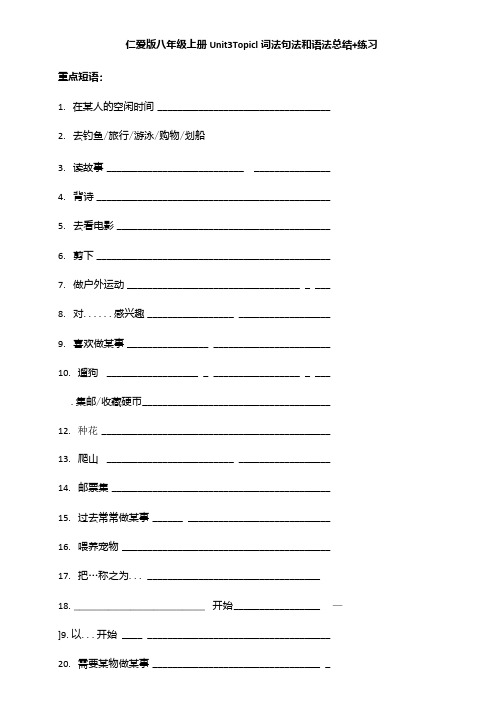
仁爱版八年级上册Unit3Topicl词法句法和语法总结+练习重点短语:1.在某人的空闲时间__________________________________2.去钓鱼/旅行/游泳/购物/划船3.读故事___________________________ _______________4.背诗______________________________________________5.去看电影__________________________________________6.剪下______________________________________________7.做户外运动__________________________________ ____8.对......感兴趣_________________ __________________9.喜欢做某事________________ _______________________10.遛狗__________________ __________________ ____.集邮/收藏硬币_____________________________________12.种花_____________________________________________13.爬山_________________________ __________________14.邮票集___________________________________________15.过去常常做某事______ ____________________________16.喂养宠物_________________________________________17.把…称之为... __________________________________18. _______________________ 开始_________________ —]9.以...开始 ____ ____________________________________20.需要某物做某事_________________________________ _21.伴着音乐跳舞____________________ ________________22.把...粘贴在...上___________________________ __23.和某人分享某物_________________________________24. ___________________________________________ 为某人提供某物-25.洗澡___________________________________________26.不论是否...... ________________________________27 .带某物/人去散步_________________________________28.对某人来说是特别的_____________________________29.讨厌做某事_____________________________________30.把…租给... ___________________________________31.去看电影______________________________________答案:I.in one's free time = in one's spare time 在某人的空闲时间2.go fishing/traveling/swimming/shopping /boating/rowing 去钓鱼/ 旅行/ 游泳/ 购物/划船3.read stories 读故事4.recite poems 背诗5.go to the movie theater= go to the movies 去看电影6.cut out 剪下7.do some outdoor activities 做户夕卜运动8.be interested in (doing) sth.“对感兴趣〃9.be fond of doing sth. = like/love/enjoy/ prefer+doing sth, 喜欢做某事10.walk a pet dog = take a dog for a walk 遛狗II.collect stamps/coins 集邮/收藏硬币12.plant flowers 种花13.climb mountains 爬山14.stamp collection 邮票集ed to do sth,过去常常做某事16.keep pets喂养宠物17.call sb. sth.把…称之为...18.get started 开始19.start with 以...开始20.need sth to do sth需要某物做某事21.dance to music伴着音乐跳舞22.stick sth. to sth.把…粘贴在...上23.share sth with sb和某人分享某物24.provide sb with sth = provide sth for sb 为某人提供某物25.take/have a bath 洗澡26.whether...or not 不论是否27.take sb/sth for a walk 带某物/人去散步28.be special to sb.对某人来说是特别的29.hate to do sth. = hate doing sth.讨厌做某事30.rent sth to sb 把…租给...31.go to the movie theater 去看电影重点句型:I.Why not/ Why don't you+动词原形?为什么不...呢?2.learn a lot from sth.从…中学到许多…3.learn sth from sb从某人身上学到…4.What do you often do in your free time? 你经常在空闲时间做什么?5.We can learn a lot about people, places, history, andspecial times from stamps. 通过这些邮票我们可以学到许多关于人文、地理、历史和特殊时代的知识。
- 1、下载文档前请自行甄别文档内容的完整性,平台不提供额外的编辑、内容补充、找答案等附加服务。
- 2、"仅部分预览"的文档,不可在线预览部分如存在完整性等问题,可反馈申请退款(可完整预览的文档不适用该条件!)。
- 3、如文档侵犯您的权益,请联系客服反馈,我们会尽快为您处理(人工客服工作时间:9:00-18:30)。
仁爱英语八年级上册语法讲解与练习初中英语一般将来时习题用法:一般将来时表示将来某个时间要发生的动作或存在的状态,也表示将来经常或反复发生的动作。
常常与表示将来的时间状语连用。
常用的表达形式共有五种,现归纳如下:一、用will或shall表示。
“助动词will或shall+动词原形”这一形式,表示将来发生的事情,用于征求对方的意见或表示客气的邀请。
在口语中will用于所有人称,书面语中第一人称常用shall。
如:二、用be going to结构表示。
“be going to+动词原形”用来表示近期或事先考虑过的将要发生的动作以及已有迹象表明必将发生某事,意为“打算;就要”。
如:We're going to meet outside the school gate. 我们打算在校门口见面。
三、用现在进行时表示。
表示位置转移的动词(如:go,come,start,move,sail,leave,arrive,stay,fly,等),可用现在进行时表示将来时。
如:They're leaving for Beijing. 他们即将前往北京。
一、选择填空:( ) 1. There __________ a meeting tomorrow afternoon.A. will be going toB. will going to beC. is going to beD. will go to be( ) 2. Charlie ________ here next month.A. isn’t workingB. doesn’t workingC. isn’t going to workingD. won’t work( ) 3. He _____ very busy this week, he ____ free next week.A. will be; isB. is; isC. will be; will beD. is; will be ( ) 4. There _______ a dolphin show in the zoo tomorrow evening.A. wasB. is going to haveC. will haveD. is going to be( ) 5. –________ you ________ free tomorrow?– No. I ________ free the day after tomorrow.A. Are; going to; willB. Are; going to be; willC. Are; going to; will beD. Are; going to be; will be ( ) 6. Mother ________ me a nice present on my next birthday.A. will givesB. will giveC. givesD. give( ) 7. – Shall I buy a cup of tea for you?–________. (不,不要。
)A. No, you won’t.B. No, you aren’t.C. No, please do n’t.D. No, please.( ) 8. – Where is the morning paper?– I ________ if for you at once.A. getB. am gettingC. to getD. will get ( ) 9. ________ a concert next Saturday?A. There will beB. Will there beC. There can beD. There a ( ) 10. If they come, we ________ a meeting.A. haveB. wC. hadD. w ( ) 11. He ________ her a beautiful hat on her next bA. givesB. gaveC. will givingD. is going ( ) 12. He ________ to us as soon as he gets there.A. writesB. has wriC. will writeD. wrote ( ) 13. He ________ in three days.A. coming backB. came backC. will come backD. is going to com ( ) 14. If it ________ tomorrow, we’ll go roller-skatiA. isn’t rainB. won’t raC. doesn’t rainD. doesn’t ( ) 15. – Will his parents go to see the Terra Cotta W tomorrow? – No, ________ (不去).A. they willn’t.B. they woC. they aren’t.D. they do ( ) 16. Who ________ we _____swimming with tomorrowA. will; goB. doC. will; goingD. sh ( ) 17. We ________ the work this way next time.A. doB. will dC. going to doD. will d ( ) 18. Tomorrow he ________ a kite in the open air ________ boating in the park.A. will fly; will goB. will flyC. is going to fly; will goesD. flies; w ( ) 19. The day after tomorrow they _______a volleyA. will watchingB. watcheC. is watchingD. is goin ( ) 20. There ________ a birthday party this Sunday.A. shall beB. will bC. shall going to beD. will g二、动词填空:1. I ______(leave)in a minute. I ______(finish)all mI ______ (leave).____________(go, not)to the cinema this afternoon. of us ____________(plant)trees on Baiyun hill next4. I ______(be)tired. I ______(go)to bed early ton5. Mary’s birthday is next Monday. Her mother _____(present.lot of people ____________(visit) the Summer Palace n 情态动词的用法和习题1. can (could)1) 表示能力,could主要指过去时间。
注意:Can表示一贯的能力,be able to表示客努力可以达到的能力2) 表示允许。
例如:表示可能性大小的顺序为:must > will > would > ought to > should > can > could> may> might情态动词练习题1. Jack described his father, who _______a brave boy many years ago, as a strong–willed manA. would beB. would have beenC. must beD. must have beenbuy a gift, but you can if you want to.A. mustB. mustn'tC. have toD. don't have to3. I have told you the truth. ______ I keep repeating it?A MustB CanC MayD Will4. I_______ have watched that movie —it’ll give me horrible dreams.A. shouldn’tB. needn’tC. couldn’tD. mustn’t5. Mark _______ have hurried. After driving at top speed, he arrived half an hour early.A. nee dn’tB. wouldn’tC. mustn’tD. couldn’t6. _______ I take the book out?—I'm afraid not.A. WillB. MayC. MustD. Needbe patient .You ______ expect the world to change so soon .A. can’tB. needn’tC. ma y notD. whether8.—I haven’t got the reference book yet, but I’ll have a test on the subject next month.—Don’t worry. You______ have it by Friday.A.couldB. shallC. mustD. mayI take this book out of the reading room?No, you______ . You read it in here.A. mightn’tB. won’tC. needn’tD. mustn’tsay that exercise is important for health, but it _______ be regular exercise.A.can B.will C.must D.may morning. I've got an appointment with Miss Smith in the Personnel Department.--Ah, good morning. You _______ be Mrs. Peters.A. mightB. mustC. wouldD. Can12.“You ____ have a wrong number,” she said. “There’s no one of that name here.”A. needB. canC. mustD. would, Professor Smith. I didn't finish the assignment yesterday.---Oh, you ____ have done it as yesterday was the deadline.A.mustB. mustn'tC. shouldD. shouldn't14. Bob would have helped us yesterday, but he-_______A. was busyB. is busyC. had been busy.D. will be busy15. John went to the hospital alone. If he_______ me about it, I would have gone with him.A. should tellB. tellsC. toldD. had told16. George is going to talk about the geography of his country, but I’d rather he_______ more on its culture.A. focusB. focusedC. would focusD. had focusedwe ___ the other road, we might have arrived here in time for the meeting. A. take B. had taken C. took D. have taken weather has been very hot and dry.--Yes. If it had rained even a drop, things would be mu now! And my vegetables .A.wouldn't dieB. didn't dieC. hadn't diedD. wouldn't have died19.Had I known about this computer program, a huge am and energy .A.would have been saved B.had been savedbe saved D.was saved20. It’s the office! So you___ know eating is not allowed Oh, sorry.A. mustB. willC. mayD. need21. What do you mean, there are only ten tickets? There___ beA. shouldB. wouldC. willD. sha22. —I don’t care what people think. —Well, you ____A. couldB. wouldC. should D can’t f ind my purse anywhere.—You have lost it shopping.is usually warm in my hometown in March,but it b sometimes.25.—How’s your tour around the North Lake? Is it beau —It____ be,but it is now heavily polluted.’s the name?Khulaifi. ____ I spell that for you?,look at the time. ____ you play the piano at such a late hour?28.—Catherine,I have cleaned the room for you.—Thanks. You____ could manage it myself.A. needn’t doB. needn’t have done’t do ’t have done29.—I’ll tell Mary about her new job tomorrow.—You____ her last week.to tell have told tell have told 30.—Excuse this the right way to the Summer Palace?—Sorry,I am not sure. But it____ be.感叹句感叹句是表达喜、怒、哀、乐以及惊奇、惊讶等强烈感叹句通常由what 或how 引导。
